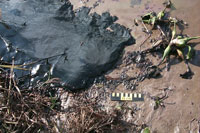A new study is looking at long-term effects of oil spills, as monitored through birds.
"Seagull blood shows promise for monitoring pollutants from oil spills," according to a new
study from the American Chemical Society. Following seagulls months and years after oil spills, a group of scientists is marking the rise in pollutants in the birds' blood. Among other things, these pollutants (Polycyclic aromatic hydrocarbons) are known to cause cancer and damage DNA. I dont' think I knew DNA could be damaged...
While oil spills quickly kill large numbers of seabirds and other animals, scientists do not fully understand the non-lethal biological effects of these spills, the Spanish researchers say.
The article in the ACM journal opened with that canary in a coal mine metaphor, again. Since I first wrote about that phrase last fall, I've seen it come up over and over again. Language travels through society like birds -- flocking and gathering and crying through the air.
This new study is crucial, of course. We look at things in such a short term perspective, we forget to look out, into the future and the past for understanding.
At the same time, while I think this will certainly prove an important study, there seems something so off with the way we look at and talk about these things. The birds -- the birds are not dying to show us when we are killing ourselves... we are killing the birds!

Photo from the Exxon Valdez Oil Spill Trustee Council.
When the Cosco Busa cargo ship spilled 58,000 gallons of oil off San Francisco bay two months ago, within a week over 1,500 birds were dead or dying from the effects. While I have been familiar with photos of oil covered birds for decades, I didn't really know what the actual effects were -- I guess I thought the birds would then suffocate. I still imagine that's part of it -- but more. They lose their waterproofing. (Another irony...) They become incapable of faring cold and water. Listen to rescue workers discuss the scene on NPR
here.
It is an overwhelming disconnect -- this one between us and the life -- the earth life -- we are part of. The overwhelming disconnect. As ever, when I feel that drowning in the person-ness we live in, I turn to poems.
Eagle Poem
by Joy Harjo
To pray you open your whole self
To sky, to earth, to sun, to moon
To one whole voice that is you.
And know there is more
That you can’t see, can’t hear;
Can’t know except in moments
Steadly growing, and in languages
That aren’t always sound but other
Circles of motion.
Like eagle that Sunday morning
Over Salt River. Circled in blue sky
In wind, swept our hearts clean
With sacred wings.
We see you, see ourselves and know
That we must take the utmost care
And kindness in all things.
Breathe in, knowing we are made of
All this, and breathe, knowing
We are truly blessed because we
Were born, and die soon within a
True circle of motion,
Like eagle rounding out the morning
Inside us.
We pray that it will be done
In beauty.
In beauty.
Joy Harjo, “Eagle Poem” from In Mad Love and War. Copyright �© 1990 by Joy Harjo. Reprinted with the permission of Wesleyan University Press.
From the Poetry Foundation Website.
















